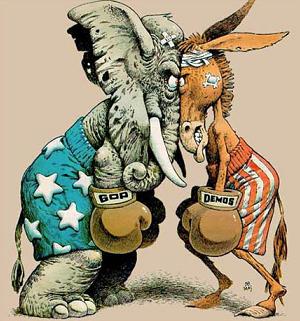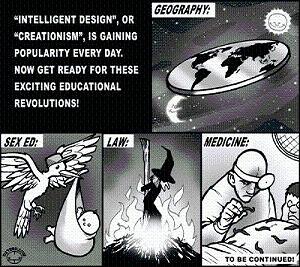The Problem with Balance: Why Both Sides is a Bad Strategy
 | | Balance is all the rage now |
It seems that now, more than ever, people are obsessed with the idea of balance. In journalism, balance is the idea of showing both sides of any story, and doing so seems fair and equitable. In education, balance is the idea of making sure children have both sides of any argument and can decide for themselves what is true. In medicine, balance is the notion of letting people choose their own medical course of treatment, out of respect for their personal beliefs. The problem, of course, is when balance is used too much, too little, or to create the illusion that there are only two sides to any given situation. It is almost blasphemous to suggest that we should ignore any alternative explanation to a story, but sometimes, things can only progress if we do just that.
In modern political discourse, for example, balance seems to be the notion of explaining both the Republican and Democrat spin on an issue. This is inherently flawed, because it ignores the possibility of a third option--the moderate one embraced by the vast majority of everyday people but patently ignored by the networks and newspapers--and because it makes room for the spread of information that may be false and previously discredited. With the shrillness and vitriole of the bipartisan political landscape taking control over every single political story, it is the people who get shortchanged out of the truth.
 | | Modern politics is one-dimensional |
Most people know this to be true, but they allow themselves to be caught up in one ideology or the other and then they convince themselves that the truth is being squandered and manipulated by the other side. These are the kinds of people who bitch about media bias, who rail against Fox News and Rush Limbaugh or MSNBC and the Hollywood elite, and who bemoan the fact that, whenever their party loses an election, it is because the people were duped by an unfair political machine.
What they--along with the overwhelming majority of modern media--fail to acknowledge is that politics is not a two-sided endeavour, nor is truth the sole property of one political party. They tend to look at the political landscape in black and white terms, when politics is, by definition, a sea of grey.
This inaccurate and bipolar world view is made much worse when it spreads to the classroom. Take the Intelligent Design crowd, for example, who argue that, in the interests of fairness and balance, the fundamentals of creationism should be taught side by side with the fundamentals of evolution. This is certainly not a new argument, but Intelligent Design has been wildly successful in recent years in taking stabs at how science is taught in this country. There are several states now that include disclaimers in the beginning of every science textbook that explain that evolution is just a theory* and that there are alternative explanations available; this is only one example of success on the part of Intelligent Design.
 | | Teaching both sides could potentially set us back a few centuries |
*First of all, gravity is also just a theory, but it has offered a simple explanation for a wide range of phenomenon. The same is true of evolution. Secondly, modern medical and biological science would not exist without the theory of evolution. And lastly, contrary to the arguments of Intelligent Design, evolution and God are not mutually exclusive or divergent concepts.
Forcing teachers to teach creationism alongside evolution is kind of like forcing them to teach astrology alongside astronomy, alchemy alongside chemistry, or Biblical analysis alongside history. Astrology, the Bible, and even creationism can certainly be offered as separate curricula, but they should not be considered equal partners with science and history. In this case, teaching both sides is counter-productive to each and it is the children who are shortchanged; they learn at a very young age to put fact on equal footing with pseudoscience and religious dogma.
Probably the worst abuse of balance, however, is the medical one. In the struggle to show both sides of every argument, we've somehow managed to allow firm standing for homeopathy, faith-based medicine, hypnosis, chiropractic, accupuncture, herbalism, naturopathy, and many other forms of "alternative medicine," despite an overwhelming number of legitimate studies that demonstrate their complete ineffectiveness.
 | | No matter what this guy tells you, he does not have a license to practice medicine |
While the Libertarian in me wants me to argue that people who die because they're too stupid to seek proper medical treatment deserve what they get in a Darwinian sort of way, there are many cases, too depressing to enumerate here, of people allowing their children or loved ones to die out of a stubborn insistence on the benefits of alternative medicine. In this case, the people being shortchanged are actually dying because of it, and that's the point at which we have to seriously reconsider the virtues of balance.
Life rarely puts things in neat counterweights where two sides are of equal value, and yet we like to treat everything nowadays as if alternative possibilities and explanations are just as valid as the largely accepted ones. We should certainly respect each other's beliefs and opinions while we question authority and conformity, but we should also not let blatant falsehoods go unchallenged, nor should we force teachers to spread religious ideals or allow medicine to be hijacked by snake oil salesmen and zealots. Balance, in short, is not always appropriate, and we need to stop treating it as a grand ideal.
-e. magill, 01/19/2009
|
|